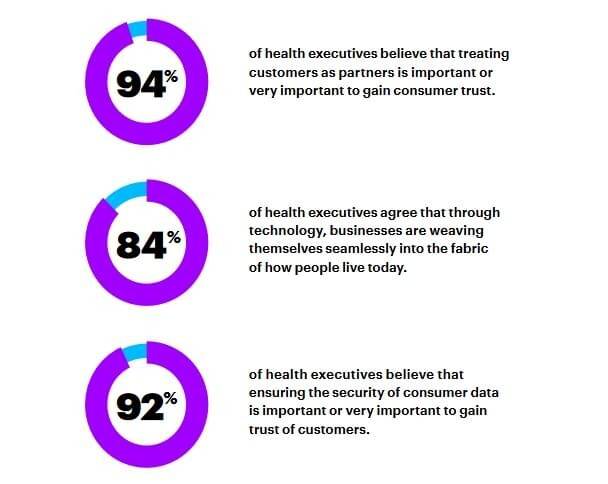Patients + machines have a greater role in medical care
Health consumers increasingly expect to use digital technologies to control when, where and how they receive care services. And with that, they are more open to using intelligent technologies, sharing data and allowing a combination of man and machine to power a new model of care.
According to our seven-country survey of 7,905 consumers, we are increasingly comfortable with the idea that technology —including artificial intelligence (AI), virtual clinicians and home-based diagnostics — will play a significantly greater role in overall medical care. For example, while only one in ten respondents have used AI-powered healthcare services, most said they are likely to try AI-enabled clinical services, such as home-based diagnostics, virtual health assistants and virtual nurses that monitor health conditions, medications and vital signs at home.

In part, the acceptance of digital care delivery stems from consumers’ familiarity with technology outside of healthcare. The use of wearable devices has nearly quadrupled in the past four years, from just 7 percent in 2014 to 29 percent today. Three-quarters of the survey respondents see wearables — such as those that monitor glucose, heart rate, physical activity and sleep — as beneficial to understanding their health condition, engaging with their health and monitoring the health of a loved one.
Care on their own terms
Done right, digital tools could have three big positive effects: putting more control in the hands of consumers, freeing up clinicians’ time, and personalizing care services. Consumers are already taking a lead on the first point. One in three survey respondents said they had accessed their electronic health records in the previous year, mostly to get information on lab and blood test results, view physician notes regarding medical visits, and view their prescription history.
The survey shows that consumers are overwhelmingly willing to share personal data with their doctor, and to a lesser degree with a nurse or other healthcare professional. Additionally, 58 percent of respondents expressed willingness to share data collected from their wearable devices with their insurance company (although they are less willing to share with their employer or a government agency). But as digital health becomes the norm, it will be vital for technology providers to make sure that their customers’ privacy is protected – one major data breach could put a dent in progress.
83% of physicians surveyed already have experienced a cyber attack
Another heartening signal from the survey – especially for stretched health service providers – is that consumers are increasingly willing to take advantage of virtual services when they are available. One fifth of respondents said they had received virtual care services in the previous year. What’s more, nearly half of those respondents said that, given a choice, they would prefer a virtual medical appointment over an in-person appointment if it meant that they had more immediate access to care.
Consumers are likely to support virtual care across a range of activities, including after-hours appointments, group therapy, education on their condition, and follow-up appointments. From a consumer’s point of view, the biggest benefits of virtual care are that they will reduce their medical bills and free up their valuable time.
As digital applications proliferate throughout the health care economy, the many benefits they offer will continually improve the industry’s performance, efficiency and outcomes, moving it onto a more sustainable path – one that could better withstand a labor shortage and an aging population while tailoring biology and service experience to markets of one.
The full report is available
here
 In part, the acceptance of digital care delivery stems from consumers’ familiarity with technology outside of healthcare. The use of wearable devices has nearly quadrupled in the past four years, from just 7 percent in 2014 to 29 percent today. Three-quarters of the survey respondents see wearables — such as those that monitor glucose, heart rate, physical activity and sleep — as beneficial to understanding their health condition, engaging with their health and monitoring the health of a loved one.
In part, the acceptance of digital care delivery stems from consumers’ familiarity with technology outside of healthcare. The use of wearable devices has nearly quadrupled in the past four years, from just 7 percent in 2014 to 29 percent today. Three-quarters of the survey respondents see wearables — such as those that monitor glucose, heart rate, physical activity and sleep — as beneficial to understanding their health condition, engaging with their health and monitoring the health of a loved one.






